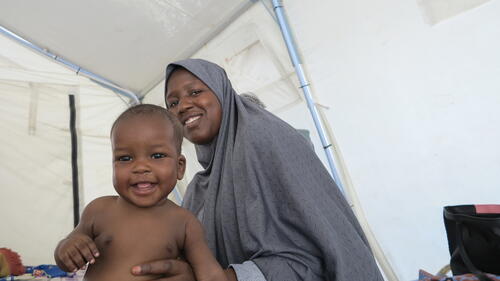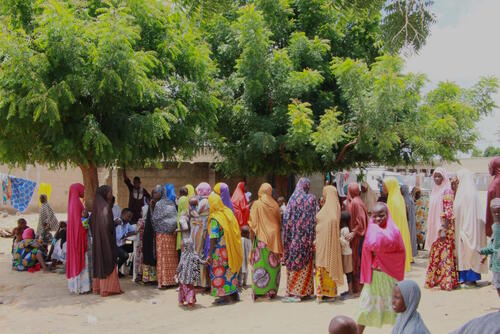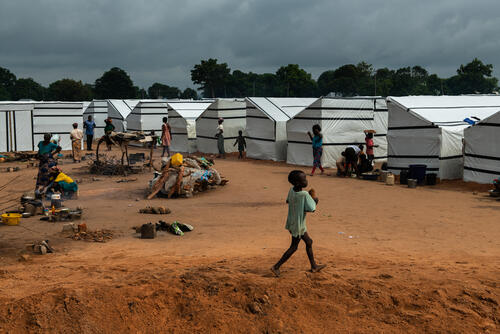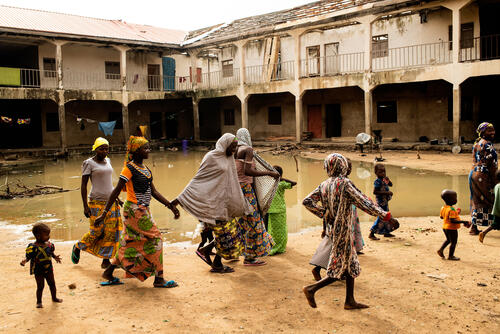Five-year-old Mustapha Osman is receiving fluids intravenously in the Médecins Sans Frontières (MSF) measles unit inside State Specialist hospital in Maiduguri, in Nigeria’s northeastern Borno State. He arrived for treatment just over three days ago, and should be ready for discharge in a few days.
“He’s one of the lucky ones to be discharged so quickly from the hospital,” says Dr Muhammad Abdullahi, as he scribbles next treatment steps for his young patient. “Most children we see are admitted for days, if not weeks. Some have complications such as severe acute malnutrition, malaria and pneumonia, and don’t survive.”
Numbers of children treated for measles by MSF in Maiduguri, Borno State
2,922
2,922
2,343
2,343
In our 70-bed measles unit in Maiduguri’s State Specialist hospital, we have treated 2,922 children for the potentially life-threatening disease since November 2018. Children with measles come from internally displaced people’s camps and also from the host community.
“Since I started practicing as a doctor in 2016, I have not seen such high numbers of measles cases in Maiduguri,” says Dr. Abdullahi. “I hope we can work swiftly to timely manage future outbreaks.”
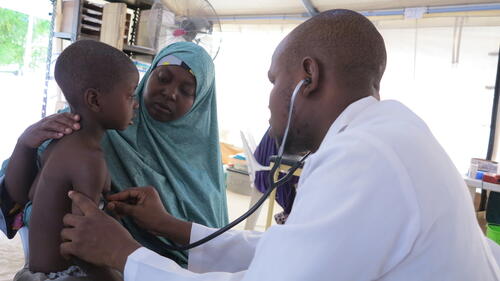
Ongoing conflict results in low vaccination coverage
The decade-long conflict in northeastern Nigeria has seen thousands of people displaced within their own country and into neighbouring countries. The disruption and chaos have left nearly two million people dependent on humanitarian assistance for their survival.
The ongoing outbreak is partly due to insufficient routine vaccination and immunisation against measles, which puts thousands of children at risk of getting infected with the highly contagious disease.
It is unacceptable that there still is a high number of children passing away from such a treatable disease.Caroline Masunda, MSF medical team leader in Maiduguri
So many patients that all the beds are full
“We are all working in crowded wards,” says Dr Theresa Chan, MSF’s medical team leader in Gwange hospital. “The enthusiasm exhibited by the staff is the reason why we’ve been able to cope so far.”
In the west of Maiduguri, we are also caring for measles patients in our Gwange hospital. In the four months from January to April 2019, our teams have treated 2,343 children with measles. And the number of cases in April was four times higher than in January. There are so many patients that the 73 isolation beds are all full.
A three-year-old girl was brought to Gwange by her mother. Since receiving treatment, for close to a month, the little girl has made a good recovery, and her joyful and grateful mother has taken her home.
The outbreak has brought a lot of loss and a lot of sadness to the community.Caroline Masunda, MSF medical team leader in Maidugur
“She started sneezing and had a high fever,” explains her mother. “The inside of her lips turned red and she was constantly vomiting. I was so worried, and I thought she was going to die.”
Some children die from measles due to severe complications. In both hospitals in which MSF works, we have recorded 58 deaths since January. But it’s only part of the global death toll.
Access to free healthcare is essential
“It is unacceptable that there still is a high number of children passing away from such a treatable disease. Though stretched to the limits, we could not turn away the children,” says Caroline Masunda, MSF medical team leader in Maiduguri. “The outbreak has brought a lot of loss and a lot of sadness to the community.”
To encourage uptake of services and limit the number of complicated cases that increase the mortality rate, the population should have access to free primary health care in Maiduguri. In addition, MSF is calling for better and swift coordination between all organisations, including Nigerian authorities, UN agencies and non-governmental organisations in availing and providing routine vaccination to children across northeastern Nigeria, in order to protect them against measles and prevent future outbreaks.
MSF has been working in Nigeria since 1996 and has had a permanent presence in Borno state since 2014. MSF teams provide lifesaving medical care in northeastern Nigeria, running projects in Gwoza, Maiduguri, Monguno, Ngala, and Pulka, while MSF emergency teams respond to disease outbreaks and other urgent humanitarian needs.



